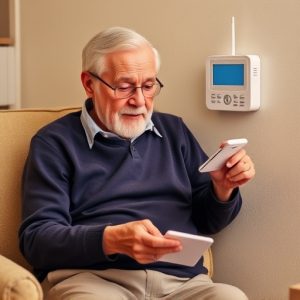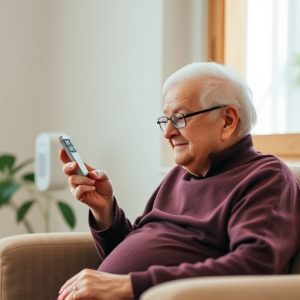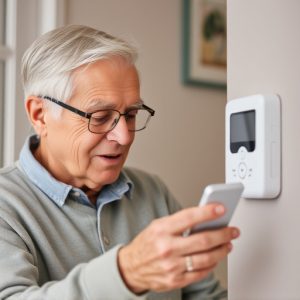Safeguarding Senior Independence: A Guide to Elderly Personal Alarm Systems
Personal alarm systems are vital tools for ensuring the safety and independence of elderly individu…….
Personal alarm systems are vital tools for ensuring the safety and independence of elderly individuals living alone. These devices facilitate immediate assistance in emergencies like falls or health issues by linking seniors with caregivers, family members, or emergency services. They feature fall detection, user-friendly designs, and clear two-way communication, which together ensure quick intervention, a critical aspect for preventing minor issues from escalating. Adopting such systems not only offers peace of mind but also allows elderly people to maintain their independence with dignity. These alarms are designed to work both indoors and outdoors, with long battery life and water-resistance, which are essential for continuous protection, even during power outages or while bathing. The best personal alarm systems for the elderly incorporate wearable devices like wristbands or pendants, provide GPS tracking, offer automatic fall detection, and have 24/7 monitoring services like GreatCall Lively Mobile and Philips Lifeline Go Help Medical Alert System. For those on a budget, there are reliable options like the Bay Alarm Medical In-Home With Fall Detection system. It's crucial to consider professional installation for optimal functionality and regular maintenance for system reliability. Personal alarm systems have been shown to significantly improve the quality of life for aging adults by providing immediate assistance and allowing them to manage their health conditions independently, thus underscoring their value in supporting elderly safety and fostering independence.
As our population ages, safeguarding the well-being of the elderly becomes a paramount concern. This article delves into the critical role of personal alarm systems designed specifically for seniors, offering a comprehensive guide to selecting and implementing these vital safety devices. From key features that enhance protection to comparative analyses of top-rated models, we explore practical installation and maintenance best practices. Moreover, through case studies and real-life success stories, we illustrate how personal alarms can not only protect but also empower independence in our aging population. Embracing these tools is an essential step towards ensuring the safety and security of our elders.
Understanding the Importance of Elderly Safety: The Role of Personal Alarm Systems
The importance of implementing personal alarm systems for the elderly cannot be overstated, as these devices play a pivotal role in safeguarding the well-being of seniors who live independently. These systems are specifically designed to offer prompt assistance in case of emergencies, such as falls or medical issues, allowing elderly individuals to maintain their autonomy while residing in the comfort of their own homes. A personal alarm for the elderly functions by immediately notifying caregivers, family members, or emergency services when activated, ensuring a swift response to any incident. This rapid alert system is critical for timely intervention, which can be the difference between a minor mishap and a major health crisis.
Furthermore, personal alarm systems are tailored with user-friendly interfaces, often featuring fall detection technology and wearable devices that are easy to operate. These alarms provide peace of mind not only to seniors but also to their loved ones, who can rest assured knowing help is just a button press away. The integration of these systems into daily life encourages a proactive approach to safety, promoting a secure environment for the elderly to navigate with confidence. By adopting a personal alarm system, families can support their elderly members in living a more independent and dignified lifestyle, while also providing an essential safeguard against potential accidents or health declines.
Key Features to Look for in a Personal Alarm for the Elderly
When selecting a personal alarm system for the elderly, it’s crucial to consider features that prioritize their safety and provide peace of mind for both seniors and their caregivers. A reliable personal alarm for the elderly should include a wearable device, such as a wristband or pendant, which can be activated with the push of a button in case of an emergency. This wearable should have a long-range connectivity feature, ensuring that the distress signal reaches the monitoring center regardless of the user’s location within their home or even outdoors. Additionally, the system must offer clear two-way communication so that the elderly individual can speak directly with the responder, facilitating immediate assistance and understanding of the situation.
Another key aspect to consider is the system’s fall detection capability. A personal alarm for the elderly that includes automatic fall detection can be life-saving, as it will alert the monitoring center even if the user is unable to press the button due to being unconscious or immobilized after a fall. Furthermore, the device should have a loud built-in alarm that can deter intruders or attract attention from passersby in non-emergency situations. Battery life and water resistance are also important considerations, as they ensure the device remains operational during unexpected power outages or when the user is in the shower or bath. These features collectively contribute to a comprehensive personal alarm system that offers the highest level of security for elderly individuals.
Top-Rated Personal Alarms for Senior Safety: A Comparative Analysis
When considering the safety and well-being of the elderly, personal alarms have emerged as a crucial tool to provide peace of mind for both seniors and their loved ones. These devices are designed to be worn at all times and offer immediate access to assistance in case of an emergency. A comparative analysis of top-rated personal alarms for elderly safety reveals several models that stand out for their reliability, ease of use, and comprehensive features. For instance, the GreatCall Lively Mobile is a popular choice among seniors who value mobility and connectivity, offering GPS location services, fall detection, and direct access to medical professionals through the 5Star Urgent Response service. Another notable option is the Philips Lifeline Go Help Medical Alert System, which provides a robust solution with automatic fall detection, waterproof design for shower safety, and a long-lasting battery life.
Furthermore, the Bay Alarm Medical In-Home With Fall Detection system offers a cost-effective solution that doesn’t compromise on essential features such as two-way voice communication and real-time location tracking. It is lightweight and designed with user comfort in mind, ensuring that it can be worn around the neck or wrist without hindering daily activities. When selecting a personal alarm for elderly individuals, consider factors such as range coverage, response time, and the types of emergencies the system can detect. Additionally, user reviews and feedback are invaluable for assessing the real-world effectiveness of these devices, ensuring that the chosen personal alarm aligns with the specific needs and lifestyle of the senior user.
Installation and Maintenance Best Practices for Elderly Personal Alarms
When implementing personal alarm systems for the elderly, it is imperative to prioritize user-friendliness and reliability. Proper installation is a cornerstone of an effective personal alarm system; it should be executed by a qualified professional who understands the specific needs and limitations that may affect seniors. This ensures that the device functions optimally within their living environment. The alarm’s wearable component, typically a wristband or pendant, must be easily accessible and comfortable for continuous use. After installation, regular maintenance checks are vital to maintain system integrity. These checks should include testing the device daily by the user to confirm it is working correctly and performing scheduled battery replacements as per the manufacturer’s guidelines. Additionally, monthly system diagnostics by a caregiver or technician can detect potential issues before they become significant problems. It is also crucial to regularly review emergency response protocols with the elderly user to ensure they are familiar with how to activate the alarm in case of an incident. By adhering to these installation and maintenance best practices, personal alarm systems for the elderly can provide a robust safety net that offers peace of mind for both the senior and their loved ones. Regular updates and software maintenance by authorized personnel also play a role in keeping the system current and secure against new technological challenges.
Enhancing Independence with Personal Alarm Systems: Case Studies and Real-Life Success Stories
The integration of personal alarm systems has significantly enhanced the independence and safety of aging individuals. These devices are designed to provide immediate assistance in emergencies, allowing seniors to maintain their autonomy while living in their own homes. Case studies have consistently shown that the implementation of personal alarms for the elderly results in a marked improvement in their quality of life. For instance, one study followed a 75-year-old woman who had been using a personal alarm system for over a year. The device enabled her to manage her chronic conditions without the constant need for family or caregiver intervention. Additionally, real-life success stories abound with seniors who have utilized these systems to quickly alert emergency services during fall incidents or sudden health issues, preventing what could have been lengthy recovery periods or, in some cases, potentially life-threatening situations. The portability of these alarms also means that users can carry them during daily activities, offering peace of mind for both the individual and their loved ones. These anecdotes underscore the practical benefits of personal alarm systems as a reliable tool for supporting elderly safety and promoting independence in their golden years.


